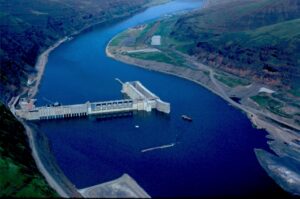Ecological Harm
Methane Ebullition in Temperate Hydropower Reservoirs and Implications for US Policy on Greenhouse Gas Emissions
July 2017 By Benjamin L. Miller ● Evan V. Arntzen ● Amy E. Goldman ● Marshall C. Richmond The United States is home to 2198 dams actively used for hydropower production. With the December 2015 consensus adoption of the United Nations Framework Convention on Climate Change Paris Agreement, it is
Update: The Lower Snake River Reservoirs Generate Significant Amounts of Methane, a Potent Greenhouse Gas
July 2020 By John Twa, Mechanical Engineer Scientists are increasingly studying and recognizing the significant amount of greenhouse gas (GHG) emissions from hydropower reservoirs. “[N]umerous studies have demonstrated that hydropower reservoirs have the potential to produce high amounts of [methane], despite initially being considered carbon-free energy sources”. In fact, ten
Economic Waste
National Economic Analysis of the Four Lower Snake River Dams
February 2016 By Johnny Mojica, Research Analyst, Earth Economics Ken Cousins, PhD, Ecological Economist, Earth Economics Tania Briceno, PhD, Ecological Economist, Earth Economics This report presents a thorough analysis of the benefits and costs of the four Lower Snake River dams in both “keep dam” and “breach dam” scenarios. The
A Rebuttal to the Pacific Northwest Waterways Association’s “The Costs of Keeping the Four Lower Snake River Dams: A Reevaluation of the Lower Snake River Feasibility Report”
In the 1960’s and 1970’s the U.S. Army Corps of Engineers constructed four dams on the lower Snake River without specific measures to allow juvenile salmon and steelhead to migrate downstream and out to the ocean. As a result, these dams killed millions and millions of juvenile salmon and steelhead
Commercial Navigation on the Lower Snake River
January 2019 By Jim Waddell, Civil Engineer, PE USACE Retired The 2002 Environmental Impact Statement (EIS) for the Lower Snake River Programmatic Sediment Management Plan (LSRPSMP) created by the U.S. Army Corps of Engineers (USACE) erroneously claimed that maintenance of the lower Snake River navigation channel provides an annual savings
Request for U.S. Department of Energy Inspector General Investigation of Waste of Federal Funds and Violations of Other Violations of Other Federal Laws by Scofflaw Culture in Upper Management of Bonneville Power Administration
February 28, 2013 Submitted by Northwest Resource Information Center This document provides documentation of Bonneville Power Administration upper management’s calculated profligate waste of federal funds and scofflaw behavior vis-à-vis operations of the Federal Columbia River Power System which, contrary to law, decimated Snake River Basin anadromous fish (herein “salmon”), drove

Waddell Amicus Brief Seeks Immediate Dam Breaching
An amicus curiae (“friend of court”) is not a party to the legal case. Amicus briefs are meant to provide additional information, expertise or insight to the court to assist with decision-making. An Amicus brief filed by Jim Waddell and a collective of experts – Chris Pinney, Deborah Giles, Ken
Real Solutions
Five Means for Breaching 4 Lower Snake River Dams
September 2017 Prepared by Jim Waddell This paper lays out five existing essential components or means that the US Army Corps of Engineers (the Corps) and Bonneville Power Administration (BPA) can utilize immediately to avoid further financial and biological losses created by the four Lower Snake River Dams (4 LSRDs).
The US President and Army Corps’ Discretion and Authority with Regard to Executive Action in Furtherance of Breaching the Lower Snake River Dams
Spring 2022 Prepared by Elizabeth Dunne This article takes an in depth look at the legal landscape applicable to the exercise of executive branch authority in the context of breaching the four dams on the lower Snake River. It demonstrates how executive authority can play an important role when it
Breaching the Snake River Dams without new Congressional Appropriations
August 2024 It is a common misconception that the four lower Snake River dams cannot be breached without new Congressional appropriations. To the contrary, the Bonneville Power Administration can use the Northwest Power Act, 16 U.S.C. §839–839h, to fund breaching of the lower Snake River dams. Learn how by reading
